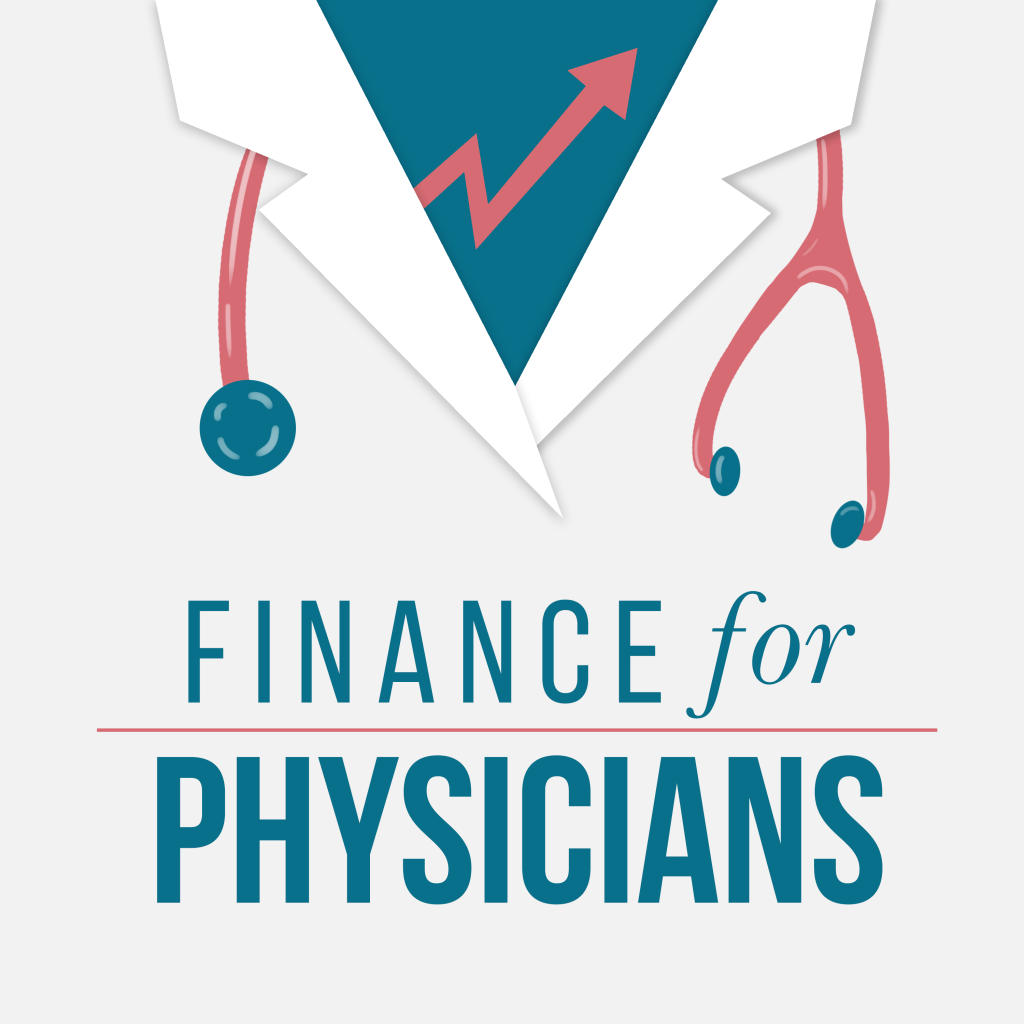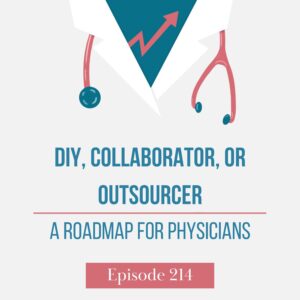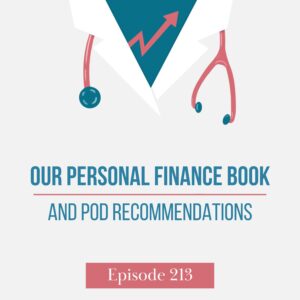- Jen Quire: LinkedIn
- StudentAid.gov
- Connect with me on my LinkedIn
- Contact Finance for Physicians
- Finance for Physicians
- To schedule a call with one of our awesome planners, book HERE.
Full Episode Transcript:
Jen Quire: It seems to be, when we talk about stress points with clients, I feel like if I had to point to one thing, it’s usually the house. Like they come to us and they’re like, “I’m stressed about budgeting. I think I bought too much house.” Like that’s a very common conversation that we have.
Daniel Wrenne: I think it might be the number one reason. I wonder what you think about this, Jen. I think it’s the number one reason we have client breakups.
Welcome to Finance for Physicians, the show where we help physicians like you use money as a tool to live a great life. I’m your host, Daniel Ren, and I’ve spent the last decade advising physicians on their personal finances with the mission to help them understand that taking control of their finances now means creating a future where they can practice medicine where, when, and how long they want to.
Daniel Wrenne: Jen, what’s going on?
Jen Quire: Hi.
Daniel Wrenne: It’s been a long time since we’ve recorded a podcast together. It’s probably been years, I think.
Jen Quire: Probably two or three, maybe.
Daniel Wrenne: Yeah, it’s long overdue. Well, I’m excited about the topics. We were just talking through them before we started recording.The topic we’re going to cover today is super fun topic I think for us and for those of you guys listening, everybody, most people listening will go through this sort of analysis or decision, if not already at some point in your life, and it’s a pretty big deal and it’s kind of exciting. It’s an exciting sort of decision and that’s tying into your home purchase.
So before we get into the meat of that discussion, so around how to make a smart decision when buying your house, I think I was just telling Jen as well, I thought it would be good to kind of put a little context around how Americans have changed in regards to how they view the home purchase. And I was explaining to Jen, I did a talk recently where we, one of the things I covered was the changes in home size, purchase price kind of thing. And so what was interesting, so I found this statistic. So in 1950, the average home size per person in the household was like 256 square feet.
Jen Quire: Hmm, okay.
Daniel Wrenne: Today, let’s see if you can guess. What do you think it is today? Per person, new home.
Jen Quire: Per person, new home. 600.
Daniel Wrenne: 950 and something.
Jen Quire: Okay, that’s way more than, yeah,
Daniel Wrenne: It’s almost 4X.
Jen Quire: That’s a lot of space.
Daniel Wrenne: Right. So, anyway, I think most people would agree home sizes have gotten considerably larger, and I guess we could argue that could be a good thing, could be a bad thing. The talk that I was giving when I referenced that statistic was kind of more around, was actually a talk on stewardship, but it was kind of looking more at a big picture.
And another thing you could look at is are Americans happier than they were in 1950. And I think that’s a pretty obvious one.
Jen Quire: The internet would tell me no.
Daniel Wrenne: The internet would tell me no. Social media would tell me, “Eh, maybe, probably yes.” Anyway, I think what it comes down to, we’re not, I’m not going to like be Debbie Downer on bigger homes are always bad.
Like I don’t agree with that, but I think what we were going to talk about is thinking about when can you afford a house? Because I think the problems happen when it’s not that bigger houses is bad for sure, and more money is not bad in itself. It’s when you don’t go through, some of the things we’re going to talk about right now, I think when you don’t think through it with a level head, reasonably in consideration of other things in life is where you have problems. And so I think, in our experience, so Jen and I get to deal with families one on one a lot.
And so this seems to be a pretty tough decision and it can kind of go a bunch of different ways, but so as we start to kind of get into what this looks like and how to make a good decision around this, what do you think is the–Jen what do you think is the most important part about how do we wrap, how do we start to wrap our heads around making this decision?
Jen Quire: Yeah, it is. It’s a tough question. And I think it seems to be the reason a lot of people reach out to us to begin with. They’re like trying to buy this house and I don’t really know how to build it in. My lender tells me that this works and think what I see on the internet tells me two and a half times income and whatever those rules of thumb are good sometimes. But I think the key is not just, you know, we’re not making this decision in a vacuum. We’re not just figuring out how much house can I afford based on my income.
It’s also based on your debts and your goals and what you want life to look like, and the house is just a piece of that. So I think in order to really have the best answer to that question, you really have to back up and start with kind of the foundations of what are your goals? What are your values? And where does the home decision fit relative to everything else that’s going on?
Daniel Wrenne: So I think a lot of times people get into that decision, I think it kind of depends on where you’re at in the progression of the decision, but I’ve talked to people that are late, especially later in the decision making.
And they’re like, “Yeah, the home is the most important thing.” So I think and that’s fair to say, but I think the best case or the best time to explore that question around what are other potential priorities and what’s most important and your values is ideally you do that before you get into the home decision because what I’ve also seen is that a lot of times when those same people are saying it’s most important they’ve kind of already got the tunnel vision on. The home is one of those the home purchase is one of those things especially when you start like going to see the homes. I think that’s when it’s like almost game over. It’s like when you yeah Visit with the realtor and you’re like, “Oh, I can see my kids growing up here and…”
Jen Quire: The million-dollar house is always going to be cooler than the 600,000-dollar house.
Daniel Wrenne: Always.
Jen Quire: It’s just, it is what it is.
Daniel Wrenne: Always. Every person will start to put themselves in the house and start to visualize what that looks like and it’s going to look really good.
Jen Quire: Justify it’s five minutes closer to my work.
Daniel Wrenne: Yeah. There’s all, yeah.
Jen Quire: There’s always a reason.
Daniel Wrenne: Always. So ideally you’re doing this exercise before you’re even thinking about grading so that you can have a clear head, but if you’re right in the middle of it, it still doesn’t hurt to think through this. It’s just something to be aware of. It’s like the sooner, the better in terms of priorities and there’s going to be maybe travel’s importance or maybe like family time is important.
So just to kind of put that to numbers a little bit. When you spend more on your home, it always, it has to come, it’s like a teeter-totter, like it always has to come from somewhere. So as you spend more on your home, you will always have less for other things by definition.
Jen Quire: And it feels pretty permanent. Like very rarely are people like, “You know what, you’re right. This house is too expensive. I’m going to sell it and we’re going to move.” Like once you’re in there, you’re kind of in there. So if you can make the decision first, just makes everything else.
Daniel Wrenne: Yeah, it’s a long-term decision. And so if you think about priorities, it’s like, “Well, a home is important, but like travel and family is also important.”
And so also talking with your spouse is important to include them because they can bring some good accountability to the table. But like, I’m thinking about spouse. It’s like if I sat down with my wife and I’m like, “We need to double our home size.” She’s going to be like, “You’re already working too much.”
Like that’s how my wife is ‘cause she’s already kind of thinking like, where’s that going to come from? And it’s got to–but that’s kind of a good, I mean, I think that’s a good way to think of it is because when you spend more on things like that, it takes away from other things like family time because you have to earn more money.
It’s got to come from somewhere. So typically it’s going to come from time or less money for travel or less time with family, that kind of thing.
Jen Quire: Yeah. Yeah. And it seems to be when we talk about stress points with clients, I feel like if I had to point to one thing, it’s usually the house.
Like, they come to us and they’re like, “I’m stressed about budgeting. I think I bought too much house.” Like, that’s a very common conversation that we have.
Daniel Wrenne: I think it might be the number one reason, I wonder what you think about this, Jen. I think it’s the number one reason we have client breakups. Like we stop working with people because, maybe not the number one reason, it’s definitely in the top three because they’ve spent too much on a home. And we say, “You’ve spent too much on a home.” And they don’t like that. And then we break up.
Jen Quire: Yeah. You start to get into the nitty gritty of cash flow and budgeting and they’re like, “Yeah, I’m going to go to Starbucks less and I’m like a hundred dollars a month,” isn’t going to solve our problem here.
Like we got to back up and really evaluate where our money is going and is that in line with the values that we talk about. If we talk about things like, “I want to be financially independent soon, or I want to be able to go to my kids’ soccer games on the weekends,” maybe making a change to your own decision is worth it if it allows for those things.
Daniel Wrenne: Right. And so it is possible if you’re already in an overpriced home, it’s possible to kind of downsize. But ideally, like, kind of the theme of all this kind of stuff is sooner the better. And ideally, you think about these things prior to upgrading because it’s much harder to downsize than it is to increase. So that’s also a word of caution as you’re considering increasing. It’s like very, very difficult to unwind these things.
Jen Quire: Yeah, and I don’t mean to sound shameful in this like if your number one priority is your home there’s a lot of emotions tied up in the home. There’s a lot of, you know, “This is how I feel like I’ve made it.”
That’s absolutely fine. I think it’s important to just make sure that actually is the number one and it doesn’t take away from everything else that you want to do. If the dream home fits in with everything else, fantastic. But I think where it’s really helpful to go through that exercise is just the context of if you buy this, then this is what everything else is going to look like. Are you okay with how everything else is going to look if you do this? If not, then let’s play with some numbers.
[Midroll] Let’s take a quick break to talk about our firm, Wrenne Financial Planning. The goal of our podcast is to empower you to make better financial decisions. But sometimes the best financial decision you can make is to work with someone who understands your financial goals and has the expertise to keep you on track to reach them.
That’s where Wrenne Financial Planning comes in. We are a full-service financial planning firm that works with over 400 physicians and their families across the country. We charge a transparent monthly flat fee for our services and offer virtual meetings you can take from anywhere. Best of all, you’ll get to work with a team that specializes in working with physician families.
So whether you’re starting out and wondering how you’ll balance your student loan payments and saving for a home, or you’re an established physician trying to figure out how to pay for your kid’s college and how much you need to save to reach financial freedom, we can help. I’ll put a link in the show notes to schedule a no-obligation meeting with one of our certified financial planners.
Wrenne Financial Planning LLC is a registered investment advisor. For more information about our firm, please visit wrennefinancial.com. That’s wrennefinancial.com.
Daniel Wrenne: Yeah, and I think, so also, when I talk with people that do say the home is very important or even most important, it’s good to kind of peel back the layers on that. Well, why is your home most important?
Jen Quire: Sure.
Daniel Wrenne: Because most of the time it might be like, “Well, so that I can have. Experiences with people,” or something. That’s a common one. But so then, so is that more important, or is the home more important? Because there’s typically some underlying things behind that. And it’s good to know that on the front end, I think. So another thing we’re going to kind of hit in on some of the numbers to like once you start to go into the, not into the weeds necessarily, but like, think about the doing the budget, I guess. Like how much can you afford?
People tend to kind of get attached to certain numbers, maybe too much even. I don’t want to discourage getting into the numbers. I think it’s good to get into numbers, but a lot of times people we talked to were like, “I did the calculator online,” or, “I talked to the lender. They’re saying interest rates are going down. We did the calculator. I can afford this.” And then they feel confident. Is that a good spot to be in there? Like, what’s the ideal way to do that?
Jen Quire: Yeah, I think the hard part with that is A, the lender has a conflict of interest to sell you the most expensive house that you can possibly get in and still pay your debts. Like there is an inherent conflict of interest there. And then you have your own conflict of interest because we all just want the most expensive house we can afford. Like that’s just kind of what it is.
Daniel Wrenne: Worst enemy.
Jen Quire: So we have two conflicts working against us already that’s usually pushing us more toward the more expensive side of things. So I think it’s really important, like we kind of talked about, just to step back and say, “Rather than how much house can I afford, what is my plan and how does a home fit into that relative to everything else? I have to pay off my student loans. I have to save for this, you know, I don’t want to have to work until I’m 80. My kids have to go to this private school. I want to be able to travel. And then I don’t want to be pinching my pennies every month, trying to figure out if I can go buy a Starbucks this month.”
And do I want to be in the position that the budget feels that tight? And you really don’t know that until you go through the full exercise of what is retirement going to cost me? What is college going to cost me? What are all these other things going to cost and how much is left over for house?
Daniel Wrenne: And I think that’s the right way to look at it. Ideally, you’re planning ahead. You’re thinking about we were like financial planners, of course. So we tend to be like saving-oriented. I guess that would be like what you would expect in a financial planner, but I kind of look at us as like we’re advocating for your financial future.
You have to think about your future self. Don’t forget about that part of your planning because you got to kind of set aside. It’s a long-term thing. You got to set aside those dollars. So you got to kind of carve out that money for your future planning. You got to think about like taxes. You got to think about other really important things and make sure that’s all kind of budgeted, I guess, and then start to back into what’s left over and then weigh your priorities against whatever home size you’re looking at. And if the home is the top priority, then you kind of, you can lean more on it. But it’s a working backwards approach as opposed to a lot of times people do the calculators online or. The lenders just use a rule of thumb that’s terrible.
It’s because it’s too aggressive. Like you should not–
Jen Quire: It doesn’t even consider you saving,
Daniel Wrenne: Should not spend 45. So 45% of your income on debt is a dumb idea. So that’s safe to say.
Jen Quire: Don’t base it based on income, like 1 million dollars to this person. And 1 million dollars to this person are totally different stories based on what’s going on behind the scenes.
Daniel Wrenne: Yes.
Jen Quire: It’s not the same.
Daniel Wrenne: Another thing. So the last kind of common thing we see people struggling with is looking at overall costs with the house itself. So like the calculator online approach, you go and you type in what the mortgage, I guess, that’s pretty much everybody thinks about the mortgage, right?
Jen Quire: And usually those calculators only show you principal and interest. They don’t even–
Daniel Wrenne: Right. And that’s a start. And that’s so almost everybody thinks about mortgage costs, but what’s interesting is people that own houses that have no mortgages still have considerable expenses.
Jen Quire: Sure.
Daniel Wrenne: So what are those expenses?
Jen Quire: And how are they going to change? I have people in Florida, you buy kind of at the top end of your range and then your property taxes skyrocket and then your home insurance skyrockets with all the hurricanes. And then it’s like, “Oh man, I don’t know if we can afford this house anymore.”
So you have to budget for the wiggle room. When you run that calculator, that’s the least amount you could possibly spend on your house from like–
Daniel Wrenne: It’s impossible.
Jen Quire: Yeah, like you’re going to replace your filters. You’re going to have to furnish the new house. You’re going to have to keep up with regular maintenance, and then the big maintenance when things go out. And I think that’s when we go through that conversation with people, I think it sounds kind of, “Sure. Yeah, I get it. I got to have wiggle room in the budget.” But then we have people come to us and they’re like, “Oh, my basement flooded and I got to tear up my carpet and fix my walls. It’s going to cost me $25,000 and I didn’t plan for this.” And so those things really do happen and we see it often. So that’s why we make sure we talk about having that wiggle room for the big stuff that pops up.
Daniel Wrenne: Yeah, like maintenance costs and standard upkeep is inevitable. I remember the first year I bought my house I live in now, which was a long time ago, actually 10, 11 years ago. And I stretched it on that. I spent too much, actually, especially the timing of it. It was like right around when we started this business there. I didn’t know I was going to start this business at the time I bought the house. Had I known I wouldn’t have done it, but it worked out okay.
But I was definitely pushing it on how much we spent given my financial situation at that time. On top of that, the first year we had it, we spent, we had like tree problems, which is just stupid. Unexpected as all get out. Like I was never thinking about tree expenses. So we spent probably $6,000 in tree removal, like dead trees, whatever, falling trees, in the first year, and that’s before anything else, normal upkeep. And so that was my first year of home, well, I’d owned a home before it, but.
Jen Quire: And $6,000 may not sound like a lot, but if you’re on a tight budget and you’ve–
Daniel Wrenne: It was a lot.
Jen Quire: Yeah, that’s going to feel like a lot when you don’t have surplus.
Daniel Wrenne: I was getting like seven tree quotes, trying to find the–
Jen Quire: And then it’s like, how much is your time worth if you’re spending a half hour per tree quote like?
Daniel Wrenne: Correct. And then I was getting into like the people I’m like, “Do you have insurance?”
Jen Quire: Because I can’t afford to go wrong.
Daniel Wrenne: Jen, what about your situation? I think it’d be good maybe to, I didn’t tell you I was going to bring this up, but you’re a good example of, I guess the non-traditional route, but you’re super smart with your finances. So it’s a wise way to do it.
Jen Quire: Yeah. I guess. So I live in Boulder. I lived in Lexington. I owned a home there and we sold it. And when we moved to Boulder, housing’s crazy here, it’s like a thousand dollars a square foot. Like my house in Lexington here would be just shy of 2 million dollars. And the cost of buying a 2 million-dollar home right now with rates what they are is significantly higher than rent.
Signif–double, more than double probably what I’m spending in rent right now. And I, as a financial planner, cannot justify that. So we’re renting and I actually kind of love it. There’s no surprises. Like, I don’t have to have, I am a planner, obviously, this is my job, but I don’t have to have those crazy thoughts in the back of my head, like, “What if this happens? What if this floods? What if my roof falls apart?” It’s not my problem. I don’t have to call the plumber. I don’t have to do any of those things. So there’s definitely a trade-off of peace of mind, of things being very predictable. I really like predictable. Homes aren’t predictable. Renting is very predictable.
Daniel Wrenne: Yeah. So renting for sure. There’s a place for renting for where it’s a smart financial decision. I think there’s this false belief in our culture that like buying is always better if you have money, but there’s plenty of cases where I tell people, “You’re way better off renting and it’s okay to rent.” And it’s not for everybody though. I mean, like I own my–
Jen Quire: I don’t have kids or dogs. Like it’s pretty easy for me to be like, “Yeah, renting is easy.” But for people in situations like mine, like you don’t, I have conversations a lot where people are like, “I live in a high cost of–I have to buy a 2 million-dollar home.”
Like you don’t have to, it’s a choice. Let’s own the choice. Like, let’s recognize that it’s a choice and there are alternatives.
Daniel Wrenne: Yeah, sometimes I’m just like, “Can you repeat that statement to yourself?” I have to buy 2 million-dollar house. Okay. Yes. I think when you start to look at your, this is a personal decision at the end of the day, like it’s very, very personal.
So that’s why financial planning is important because it personalizes it. And that’s why rules of thumbs are garbage in this sort of decision because it’s completely not personalized. And so everybody’s going to be different. But I think generally speaking, the more secure, not secure, but like anchored, I guess, your life is the more predictable your future is, the more like you know you’re gonna stay married, you have multiple kids, you’re gonna be in the area, you’re in the schools, you know, the job and you love the people you work with and it’s not going anywhere, and there’s no chance you’re moving anywhere. Like, that’s like leaning heavier and heavier towards owning. You still have to kind of do the financial plans, look at the numbers and weigh your priorities and do that deal. But like, I think that’s kind of the lean, the more you have that going on.
Like I have three kids that are solid, we’re staying here. There’s zero chance I will ever move from this area. And it just makes more sense to own on the other end of the spectrum. If you’re like, I think of myself when I was like in undergrad was the least predictable, super, my finances weren’t in a great position. I was almost guaranteed to move a lot. I had no idea what I was going to do. Or if you’re starting a brand new job that’s heavily dependent on the home thing.
Jen Quire: Yeah.
Daniel Wrenne: More uncertainty or just flexibility I guess is maybe a better word. When you start to lean that direction, renting can make a lot of sense.
So there’s a lot of people starting in practice, I think, that’s a good example in our in–you guys listening’s world and our world, that can be dicey when you move to a brand new area and you got a new job, everything’s new.
Jen Quire: You end up not liking that job.
Daniel Wrenne: Yeah. You buy the $2 million-dollar house. Job sucks. You’re kind of locked in a little bit or maybe a lot, especially if the market goes south. That’s a disaster zone.
Jen Quire: Yeah. And I think that just all kind of comes back to you don’t know what you don’t know. And sometimes you just need an extra set of eyes to say, “Hey, have you considered this? The idea of renting, you’re not just throwing money away always.” It can make sense for some situations, some locations. So I think just having someone to help you kind of run through those alternatives is super important.
Daniel Wrenne: Yep. Awesome. Well, anything else you can think of to add, Jen? I think we kind of covered that.
Jen Quire: I don’t think so. I think that’s the bulk.
Daniel Wrenne: Awesome. Well, good getting you back on. It’s been a while, so we’re going to have to do this again soon.
Jen Quire: Let’s do it.
No guests or clients appearing on the podcast received any form of compensation for their appearance and obtained no other benefit from us. It should not be assumed that every client has had the same experience.









